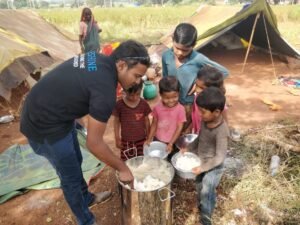Table of Contents
When you choose to support an NGO, you’re investing in change. Whether you’re a CSR manager allocating a corporate budget, a business owner hosting a fundraiser, or a compassionate individual making a donation, you want to know that your contribution is making a real difference, and know how NGOs measure impact. You’re not just giving away resources; you’re funding hope, progress, and tangible outcomes.
But how can you be sure? The answer lies in robust impact measurement.
At Reshine Org, we believe that transparency isn’t just a buzzword—it’s our promise to you. Measuring our impact is central to our mission of fighting hunger and reducing food waste in India. It’s how we validate our work, improve our processes, and, most importantly, demonstrate our accountability to our partners and the communities we serve.
This guide will walk you through the essential steps of how credible NGOs measure their impact, giving you the confidence to choose partners who deliver real results.
Why Impact Measurement Matters for NGOs and Donors Alike
Impact measurement is the systematic process of collecting, analyzing, and using data to understand the effects of an organization’s work. For a responsible NGO, it’s not just about counting activities; it’s about understanding the true change they create.
For NGOs like Reshine, impact measurement helps us:
- Improve Our Programs: Data shows us what’s working and what isn’t, allowing us to serve people more effectively.
- Demonstrate Accountability: We owe it to our donors to show how their funds are used and the outcomes achieved.
- Build Trust: Transparent reporting builds long-term, meaningful partnerships with businesses and individuals.
- Attract Funding: Evidence of impact makes a compelling case for continued and new support.
For you, the donor, understanding impact measurement allows you to:
- Make Informed Decisions: Support organizations that can prove their effectiveness.
- Maximize Your Social Return on Investment (SROI): Ensure every rupee donated creates the greatest possible benefit.
- Fulfill CSR Mandates: Provide clear, data-backed reports on your company’s social initiatives.
The Step-by-Step Framework for Measuring NGO Impact
Effective impact measurement follows a logical cycle. Here’s a breakdown of the key steps we use at Reshine Org and that you should look for in any NGO.
Step 1: Define Clear Goals and Objectives
Before you can measure anything, you must know what you’re aiming for. This starts with a clear theory of change. We ask ourselves: What specific problem are we trying to solve? What does success look like?
- Example from Reshine: Our primary goals are:
- Goal 1: Reduce food waste from businesses and events in our community.
- Goal 2: Alleviate hunger by providing nutritious meals to underserved individuals.
Step 2: Identify Key Performance Indicators (KPIs)
KPIs are the specific, measurable metrics that track progress toward our goals. They turn abstract goals into concrete numbers. Credible NGOs will have a mix of output and outcome indicators.
- Output Indicators: These measure the immediate, tangible results of our activities. They answer the question, “What did we do?”
- Outcome Indicators: These measure the broader, longer-term changes that occur because of our activities. They answer the question, “What difference did we make?”
Reshine Org’s KPIs in Action:
| Goal | Output Indicators (The “What We Did”) | Outcome Indicators (The “Change We Created”) |
|---|---|---|
| Reduce Food Waste | – Kgs of surplus food collected – Number of donor partners | – Environmental impact (CO2 emissions reduced) – Percentage reduction in waste for a partner |
| Alleviate Hunger | – Number of meals served – Number of beneficiary communities | – Improved food security for families – Money saved by beneficiaries on food |
Step 3: Data Collection: The Foundation of Evidence
You can’t manage what you don’t measure. NGOs need reliable systems to gather data on their KPIs. At Reshine, our data collection is integrated directly into our operations.
Our methods include:
- Digital Logs: We use simple mobile forms for our volunteers to log every food collection—recording the weight, source, and type of food.
- Beneficiary Tracking: We maintain respectful records of the communities and individuals we serve to ensure consistent support and avoid duplication.
- Partner Surveys: We regularly survey our food donors (like hotels and caterers) to understand their waste reduction impact and satisfaction.
- Field Stories: We complement quantitative data with qualitative stories and testimonials that put a human face to the numbers.
Step 4: Data Analysis and Reporting
Raw data alone isn’t impact. The magic happens when we analyze this data to extract meaningful insights. We look for trends, calculate totals, and assess our performance against our targets.
This analysis forms the basis of our transparent reporting, which we share through:
- Annual Impact Reports: Detailed documents showcasing our achievements, financials, and stories.
- Regular Donor Updates: Personalized reports for our corporate partners on the impact of their specific contributions.
- Public Dashboards: Easy-to-understand infographics on our website that show our cumulative impact in real-time (e.g., “Meals Served This Month”).
Step 5: Learning and Adapting
The final, and most crucial, step is using these insights to improve. Impact measurement is a cycle, not a one-time event. If the data shows a certain approach isn’t working, we adapt. If it shows something is highly effective, we scale it.
For instance, our data might reveal that we receive a large amount of surplus bread. This insight could lead us to partner with a community kitchen that can creatively use bread in various dishes, ensuring nothing goes to waste and meals are more diverse.
Transparency in Action: A Glimpse into Reshine’s Impact
We don’t just talk about impact; we live it. Here’s a snapshot of what our measurement allows us to report:
- Over 250,000 meals served to date by redirecting surplus food.
- Prevented over 50,000 kgs of quality food from ending up in landfills.
- Partnered with 30+ businesses across the city to manage their surplus responsibly.
These numbers tell a story of collective effort. But behind each number is a person who didn’t go to bed hungry, a family that felt cared for, and a community that became stronger.

Your Role in Creating Measurable Change
Choosing to support an NGO is a significant decision. By now, you understand that the most effective partners are those who can clearly articulate and prove their impact. You have the right to ask questions and expect clear answers.
When evaluating an NGO, don’t hesitate to ask:
- What are your primary goals and how do you measure progress towards them?
- Can you share your latest impact report or financial statements?
- How do you ensure the dignity and respect of the people you serve?
Partner with Reshine Org for Tangible Impact
At Reshine Org, we are committed to being a transparent, effective, and compassionate partner in the fight against hunger. We measure our impact meticulously because we believe your generosity deserves nothing less than life-changing results.
If you are a CSR manager, business owner, or individual looking to make a tangible difference in your community, we invite you to join us.
Ready to see how your contribution can create a wave of positive change?
Request Our Latest Impact Report to see the full details of our work, or Contact Us Today to discuss a potential partnership. Together, we can nourish communities and create a world without waste or hunger.




